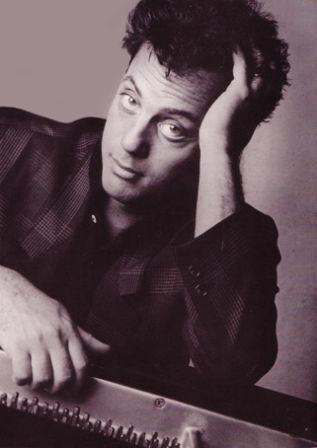
Sing Us A Song, You're The Piano Man
I discovered Billy Joel through his connection with Sir Elton John. Obviously, I had been on very good terms with songs like “Piano Man” and “Uptown Girl” long before I ever bought my fist Billy Joel record, and I recall that the one song of his that had me buying that album (a compilation) was “She’s Always A Woman”. I know the Elton/Billy comparison is a frequent one, but having listened to the output of both artists I can tell you it is a bit of a gratuitous comparison.
To begin with, Billy not only sings and plays the piano but actually writes the music and the words to his songs. Elton (as you probably know) writes only the music. That might be one of the reasons why Billy Joel only released about a dozen albums while Elton has released over 50 and counting.
But the main difference to me seems to lie in the actual subject matter. Simply put, Elton’s career has a somehow farcical value attached to it by many. Personally, I don’t like to use that expression when talking about Elton but it is the one that best defines a significant part of his career, and (most tellingly) the one that made him a star. And a fact is a fact: there is not an album within Elton’s discography that has the cultural significance of something like “The Nylon Curtain”, nor a song like “We Didn’t Start The Fire”.
Since Billy’s career has been shorter than Elton’s (he quitted recording rock and roll after releasing the “River Of Dreams” album in 1993), it is easier to get acquainted with his work and the filler is less abundant.
Still, Billy has always had something akin to a rocky relationships with critics. His one album that received almost unanimous praise was precisely “The Nylon Curtain” (1982), and that was one of the albums of his that failed to attain good sales.
He began his solo career in 1971, with a record called “Cold Spring Harbor”. His next album would be the one to garner some attention, as it included his signature song: “The Piano Man”- it hit the Top 40 alright, but it wasn’t such a big smash then as many might be led to think now. By his fourth album (“Turnstiles”, 1976) he had is act worked out, and the two records that followed (”The Stranger” and “52nd Street”) established him as a hitmaker. He continued scoring big hits during the ‘80s, and he was to accumulate four number 1 singles and a lot of songs that went pretty close to the top spot.
A very evocative ballad, and a number 1 single:
As I said above, he stopped recording rock and roll music in 1993, after he released “The River Of Dreams”. He was to release an album of classical-oriented compositions in 2001 entitled “Fantasies & Delusions”, and then he released no more albums except for some live sets.
From my vantage point, Billy Joel is a consummate craftsman of songs, paying equal attention to the music and the lyrics he writes. He used to have such high standards that I am not surprised the well ran dry. And I respect (and admire) his decision to call it a day. He left behind an excellent catalog, made up of songs which are catchy and socially relevant at the same time. If you like music that carries a meaning and resonates enough as to be remembered long after the records have stopped spinning, you might like to give this American pianist a try. And in any case, a compilation of his is a must for those who like music of the mid-‘70s to the end of the ‘80s.

Pingback: Google Instant Meets Bob Dylan & Billy Joel | MusicKO